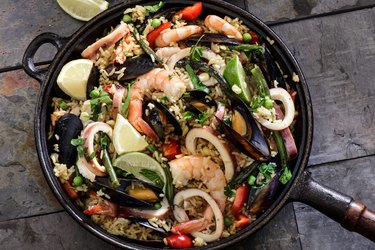
When looking at diets from around the globe, it's always interesting to see how the American diet compares with other cuisines. One diet that comes up often when discussing health and mortality rates is the Spanish diet, especially as Spain just received the title of the world's healthiest country.
Spanish Dietary Habits
Video of the Day
Could the Spanish diet contribute to better health? That's one of the questions researchers attempted to answer when looking at data to forecast life expectancy. And what they found in an October 2018 study published in the Lancet is that by 2040, Spain is forecast to have the highest life span, at almost 86 years.
Video of the Day
Further, the Bloomberg 2019 Healthiest Country Index ranked Spain as the world's healthiest country. Countries get this ranking based on life expectancy, risks such as tobacco use and obesity and environmental factors.
Many experts say the Spanish diet resembles the Mediterranean diet. However, an older November 2010 study published in the European Journal of Clinical Nutrition reports something different. Based on data collected from 2000 through 2006, the researchers found that the food consumption patterns in Spain have changed dramatically since the 1960s. This led them to conclude that the diet based on these findings is different from the traditional Mediterranean diet.
Another September 2018 study published in the journal Nutrients looked at breakfast consumption in Spain and how it affects the overall diet quality. Based on the data, they found that most (> 85 percent) of the Spanish population eat breakfast regularly and that what they eat at breakfast accounts for 16 to 19 percent of their daily intake.
They also found that the Spanish breakfast was higher in carbohydrates, added sugars, sodium, thiamin, riboflavin, folates, iron, potassium, magnesium, phosphorus and calcium, relative to its daily energy contribution. What's more, they also found that the meal is low in protein, fiber, total fat, beta-carotene, vitamins E and D and water intake.
The Spanish Food Pyramid
According to the food-based dietary guidelines for Spain published by the Food and Agriculture Organization of the United Nations (FAO), Spain uses a food pyramid with dietary recommendations in line with the traditional Mediterranean diet. Further, they divide their pyramid into food groups that are placed under three levels of consumption.
- Daily: whole-grain cereals and products, fruits, vegetables, olive oil and dairy products
- Weekly: fish, poultry, pulses, nuts, potatoes, eggs, red meat and meat products
- Occasionally: sweets, snacks and sweetened beverages
Like many other diets from around the globe, the recommendations for the Spanish diet include eating a variety of foods. Some of the other key points about the Spanish meal plan based on the food pyramid include:
- Eat five to six small meals a day, with daily food intake divided up evenly.
- Include plenty of grains, preferably whole grains.
- Aim for five servings of fruits and vegetables daily.
- Consume fish two to four times a week.
- Focus on good fats such as unsaturated fatty acids (olive oil), omega-6 (sunflower oil and soya oil) and omega-3 (nuts and soya oil and fatty fish).
- Choose carbohydrates that are rich in fiber.
- Limit salt.
- Drink at least 1.5 liters of water per day.
The Mediterranean Diet
The FAO linked the Spanish diet food pyramid with the Mediterranean diet. But what exactly is the Mediterranean diet and how does it help keep Spain at the top of the life expectancy list?
According to the Cleveland Clinic, the Mediterranean diet, which is actually more of a lifestyle rather than a diet, is rich in fruits, vegetables, legumes, nuts and olive oil. Fish, especially those high in omega-3 fatty acids is recommended at three servings per week.
It also favors healthy fats like extra virgin olive oil. The foods to avoid include refined sugar, refined grains, processed meats, highly processed foods, trans fats and refined oils.
The Mayo Clinic points out that the Mediterranean diet, which can help promote health and prevent chronic disease, is one of the healthy eating plans recommended by the Dietary Guidelines for Americans. Plus, the Harvard T.H. Chan School of Public Health says the research supports adopting a Mediterranean diet to help lower the risk of cardiovascular diseases, increase life span and promote healthy aging.
- Food and Agriculture Organization of the United Nations: "Food-Based Dietary Guidelines-Spain"
- European Journal of Clinical Nutrition: "Evaluation of Food Consumption and Dietary Patterns in Spain by the Food Consumption Survey: Updated Information"
- Nutrients: "Breakfast Consumption in Spain: Patterns, Nutrient Intake and Quality. Findings From the ANIBES Study, a Study From the International Breakfast Research Initiative"
- Lancet: "Forecasting Life Expectancy, Years of Life Lost, and All-Cause and Cause-Specific Mortality for 250 Causes of Death: Reference and Alternative Scenarios for 2016–40 for 195 Countries and Territories"
- Mayo Clinic: "Mediterranean Diet for Heart Health"
- Bloomberg: "These Are the World’s Healthiest Nations"
- Cleveland Clinic: "Mediterranean Diet"
- Health.gov: "2015–2020 Dietary Guidelines for Americans"
- Harvard T.H. Chan School of Public Health: "Diet Reviews: Mediterranean Diet"